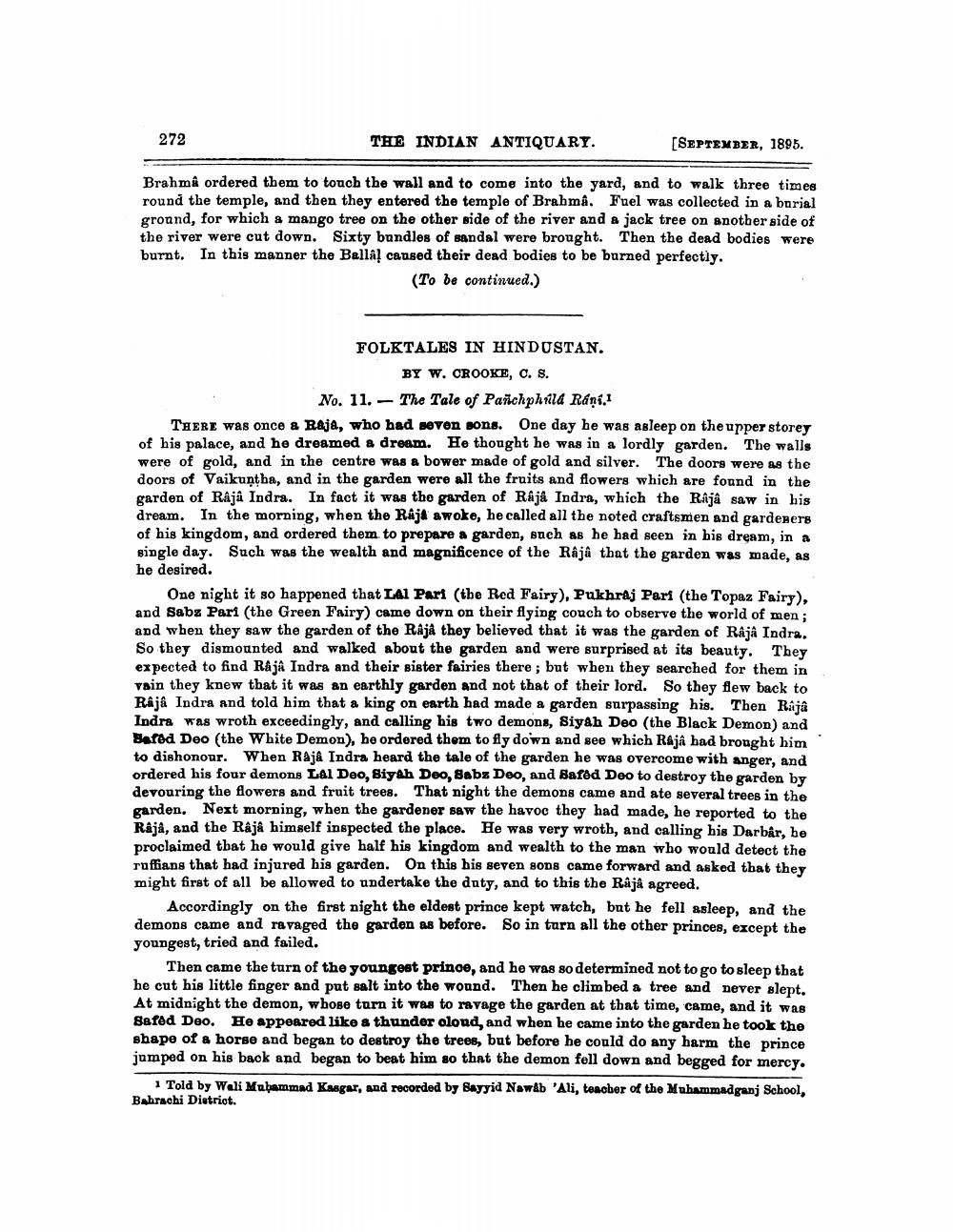________________
272
THE INDIAN ANTIQUARY.
[SEPTEMBER, 1895.
Brahmâ ordered them to touch the wall and to come into the yard, and to walk three times round the temple, and then they entered the temple of Brahma. Fuel was collected in a burial ground, for which a mango tree on the other side of the river and a jack tree on another side of the river were cut down. Sixty bundles of sandal were brought. Then the dead bodies were burnt. In this manner the Balla! caused their dead bodies to be burned perfectly.
(To be continued.)
FOLKTALES IN HINDUSTAN.
BY W. CROOKE, C. S.
No. 11. - The Tale of Panchphrild Rani.1 THERE was once & Raja, who had seven sons. One day he was asleep on the upper storey of his palace, and he dreamed a dream. He thought he was in a lordly garden. The walls were of gold, and in the centre was a bower made of gold and silver. The doors were as the doors of Vaikuntha, and in the garden were all the fruits and flowers which are found in the garden of Râjâ Indra. In fact it was the garden of Raja Indra, which the Râjâ saw in his dream. In the morning, when the Rajd awoke, he called all the noted craftsmen and gardeners of his kingdom, and ordered them to prepare a garden, such as he had seen in his dream, in a single day. Such was the wealth and magnificence of the Râjâ that the garden was made, as he desired.
One night it so happened that Lal Pari (the Red Fairy), Pukhraj Pari (the Topaz Fairy), and Sabz Pari (the Green Fairy) came down on their flying couch to observe the world of men; and when they saw the garden of the Raja they believed that it was the garden of Raja Indra. So they dismounted and walked about the garden and were surprised at its beauty. They expected to find Raja Indra and their sister fairies there ; but when they searched for them in vain they knew that it was an earthly garden and not that of their lord. So they flew back to Raja Indra and told him that a king on earth had made a garden surpassing his. Then Raja Indra was wroth exceedingly, and calling his two demons, Siyah Deo (the Black Demon) and Bared Deo (the White Demon), he ordered them to fly down and see which Râjâ had brought him to dishonour. When Raja Indra heard the tale of the garden he was overcome with anger, and ordered his four demons Lal Deo, Siyah Deo, sabz Deo, and Safed Deo to destroy the garden by devouring the flowers and fruit trees. That night the demons came and ate several trees in the garden. Next morning, when the gardener saw the havoc they had made, he reported to the Raja, and the Rajá himself inspected the place. He was very wroth, and calling his Darbar, he proclaimed that he would give half his kingdom and wealth to the man who would detect the ruffians that had injured his garden. On this his seven sons came forward and asked that they might first of all be allowed to undertake the duty, and to this the Rajá agreed.
Accordingly on the first night the eldest prince kept watch, but he fell asleep, and the demons came and ravaged the garden as before. So in turn all the other princes, except the youngest, tried and failed.
Then came the turn of the youngest prince, and he was so determined not to go to sleep that he cut his little finger and put salt into the wound. Then he climbed a tree and never slept. At midnight the demon, whose turn it was to ravage the garden at that time, came, and it was Safed Deo. He appeared like a thunder olond, and when he came into the garden he took the shape of a horse and began to destroy the trees, but before he could do any harm the prince jumped on his back and began to beat him so that the demon fell down and begged for mercy.
1 Told by Wali Muhammad Kaagar, and recorded by Sayyid Nawab 'Ali, teacher of the Muhammadganj School, Bahrachi District.




